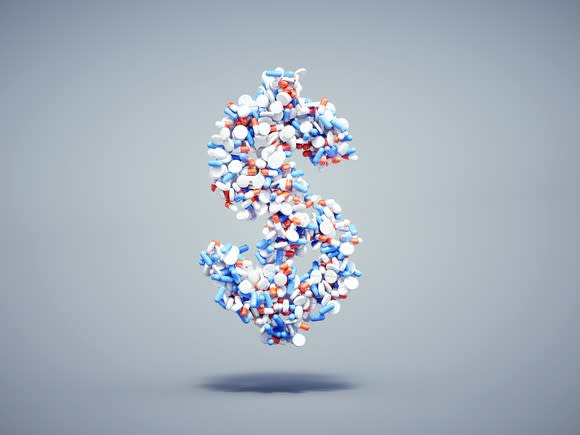3 Best Big Pharma Stocks of 2018 So Far
Believe it or not, we're nearly halfway through 2018. At least so far, this year hasn't been as great for big pharma stocks as 2017 was. But that doesn't mean there aren't some big pharma stocks that have performed well in 2018.
The three best big pharma stocks so far this year are Teva Pharmaceutical Industries Ltd (NYSE: TEVA), GlaxoSmithKline (NYSE: GSK), and Merck (NYSE: MRK). What's behind the success for these big pharma stocks -- and can their momentum continue?

Image source: Getty Images.
1. Teva
Teva easily ranks as the biggest big pharma winner in 2018 thus far. The Israel-based drugmaker's share price has soared close to 24% year to date. That's a far different story than 2017, when Teva lost nearly half of its market cap.
This year started out looking dismal for Teva. One bright spot was that Warren Buffett's Berkshire Hathaway bought a stake in the troubled drugmaker. That news only provided a temporary spark for Teva, though.
However, after bottoming out in early April, Teva staged a nice comeback. It certainly helped that a May financial disclosure showed that Buffett had doubled down on his Teva bet. The drugmaker also increased its full-year 2018 earnings guidance by $0.15 per share and boosted its free cash flow estimate by $400 million.
Investors have several things to look forward to with Teva. The company's restructuring program appears to be on course to deliver $1.5 billion in cost reductions this year. Teva also hopes to win FDA approval of migraine drug fremanezumab by September 16, 2018.
2. GlaxoSmithKline
GlaxoSmithKline (GSK), like Teva, lost ground last year, with its stock declining by nearly 8%. So far in 2018, though, GSK's share price is up more than 12% -- trouncing the major indexes.
Investors applauded GlaxoSmithKline's move in April to buy out Novartis' stake in a consumer healthcare joint venture the two companies formed. GSK had previously been in the running to buy Pfizer's consumer healthcare unit. The Novartis deal made more sense, though, and is expected to boost adjusted earnings in 2018 and in future years.
GlaxoSmithKline continues to enjoy solid growth for its Ellipta line of respiratory drugs. The company's dolutegravir-based HIV drugs are also performing very well. In addition, GSK's sales have been helped by a strong launch for shingles vaccine Shingrix.
All of these products should contribute to GSK's future fortunes. The British drugmaker also claims one of the top five most valuable pipeline assets, according to market research firm EvaluatePharma. Experimental multiple myeloma drug GSK2857916 ranked No. 5 on EvaluatePharma's list of drugs in development. The drug is projected to generate sales of close to $1.4 billion by 2024.
3. Merck
Merck was also a loser in 2017. The big pharma stock has taken investors on a roller-coaster ride this year. That ride is on an upswing right now, though, with Merck stock gaining 8% year to date.
Most of Merck's good fortunes in 2018 stem from one drug: Keytruda. In April, the company announced positive results from its Keynote-042 phase 3 clinical study of Keytruda as a first-line treatment of non-small cell lung cancer (NSCLC). Merck followed up with more great results for Keytruda in phase 3 studies targeting treatment of melanoma and in combination with other drugs in treating NSCLC.
It wasn't surprising that Keytruda was the star in Merck's Q1 results. Sales for the cancer drug skyrocketed 151% year over year to nearly $1.5 billion. More approved indications could be on the way. Keytruda appears destined to soon become the top-selling cancer drug in the world.
Merck does have a few bright spots other than Keytruda as well. The company's vaccines business is performing well, with human papillomavirus (HPV) vaccine Gardasil leading the way. Merck also continues to receive a solid contribution from its animal health business.
Are they buys?
Are any of these big pharma stock winners of 2018 so far good picks for investors right now? I'm not sold on any of them.
Teva could be a great turnaround story. However, there are plenty of hurdles the company needs to face first. The U.S. generic drug market continues to flounder. Teva's top-selling product, multiple sclerosis drug Copaxone, is expected to lose market share with a generic version now available.
Keytruda will no doubt keep its strong momentum going. That's the good news for Merck. On the other hand, sales for the company's cardiovascular drugs Zetia and Vytorin are being hurt by generic competition. Newer diabetes drugs could steal some thunder from Januvia and Janumet.
GlaxoSmithKline is definitely in better shape than Teva. And the drugmaker isn't heavily dependent on one drug for growth like Merck is. However, GSK's HIV drugs could run into significant challenges from Gilead Sciences' powerful new drug, Biktarvy.
I don't think these big pharma stocks are horrible choices for investors, especially when you throw Merck's and GSK's dividends into the equation. However, I'm skeptical that these winners of the first half of 2018 will be the biggest big pharma winners over the long run.
More From The Motley Fool
Keith Speights owns shares of Gilead Sciences and Pfizer. The Motley Fool owns shares of and recommends Berkshire Hathaway (B shares) and Gilead Sciences. The Motley Fool has a disclosure policy.

 Yahoo Finance
Yahoo Finance 